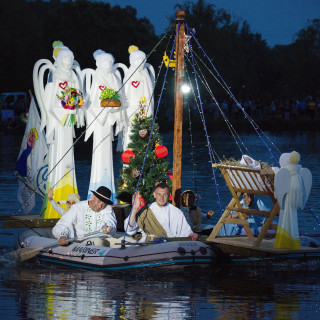Andy's Wordshop
I've been asked to write something about clothes, so here you are: surely everybody knows by now that English-speaking men (especially sportsmen) DON'T usually wear a dress. Women might wear a
dress in the summer, or to a wedding or a ball, and then it's more likely called a gown. Sportspeople wear a jersey, a shirt, a singlet or a top. British men wear a vest (tielko) under their shirt,
while Americans might wear a vest (vesta) under their suit jacket, but in the UK that's called a waistcoat. British men wear trousers, which Americans call pants. British men wear pants (slipy)
under their trousers. Superman wears his briefs on top of his tights, and there's a rumour that real Scotsmen wear nothing under their kilts.
Tricky Words in this week's OVI
One thousand five hundred years. This is a good example of how large numbers in English are expressed (apart from a couple of details) in the same order as they are expressed in Slovak. The details
are that it's typical to say "and" after "hundred", and after "thousand" up to 1 100, and it's more frequent to say "one" rather than "a", except "a hundred and …" from 101 to 199 and "a thousand
and …" from 1001 to 1099. Car engine capacity can be expressed as "one-point-four", "one-point-six", "two liter", "three-point-five liter vee-six tee-dee-eye". Years are expressed in pairs of
smaller numbers, like "nineteen-eighty-nine" or "twenty-fourteen", except for "two thousand" up to "two thousand nine" (then it changed to "twenty-ten").
Na podujatí Košické Benátky prezentovali svoje plavidlá aj naše spriatelené detské domovy.











